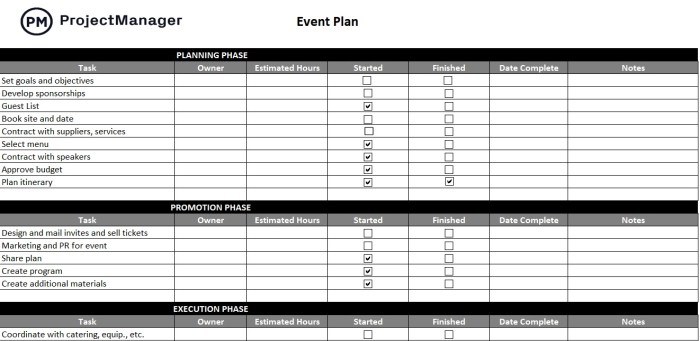Event Planning Tips: Get ready to dive into the world of event planning with these essential strategies that will take your events to the next level. From setting objectives to managing budgets, we’ve got you covered. Let’s roll!
Importance of Event Planning
Event planning is like the secret sauce that makes any event pop! It’s the behind-the-scenes magic that ensures everything runs smoothly and seamlessly. Without proper planning, events can quickly turn into chaotic disasters. Here are some key reasons why event planning is absolutely crucial:
Ensures Everything is on Point
- Thorough event planning helps ensure that every aspect of the event is carefully thought out and executed. From the venue selection to the decorations to the schedule, every detail is planned to perfection.
- Having a solid plan in place helps avoid any last-minute hiccups or surprises, making sure that everything goes according to plan.
Creates Memorable Experiences
- Effective event planning can turn an ordinary event into an unforgettable experience for attendees. By carefully curating every aspect of the event, from the theme to the activities, you can create a lasting impression on guests.
- Well-planned events are more likely to leave a positive impact on attendees, leading to better feedback and increased engagement.
Maximizes Resources and Budget
- Proper event planning helps maximize resources and budget by ensuring that every dollar spent is utilized efficiently. This can result in cost savings and a higher return on investment for the event.
- By planning ahead and making informed decisions, you can avoid unnecessary expenses and allocate resources where they will have the most impact.
Setting Objectives and Goals
Setting clear objectives and goals for an event is crucial for its success. It provides a roadmap for planning, execution, and evaluation. To set effective objectives and goals, event planners should follow a structured process and ensure alignment with the event’s purpose.
Process of Setting Objectives and Goals
When setting objectives and goals for an event, it is essential to follow the SMART criteria:
- Specific: Objectives should be clear and well-defined, leaving no room for ambiguity.
- Measurable: Goals should be quantifiable to track progress and measure success.
- Achievable: Objectives should be realistic and attainable within the given resources and constraints.
- Relevant: Goals should align with the overall purpose and theme of the event.
- Time-bound: Objectives should have a set deadline for completion to ensure accountability and focus.
Aligning Goals with Event’s Purpose
By aligning goals with the event’s purpose, planners can enhance planning efficiency and ensure that every aspect of the event contributes to its overall success. For example, if the event’s purpose is to raise awareness about a cause, the objectives and goals should focus on reaching a specific target audience, generating media coverage, and ultimately increasing support for the cause.
This alignment helps in prioritizing tasks, resources, and strategies that directly contribute to the desired outcomes.
Budgeting and Financial Management

When it comes to event planning, budgeting and financial management play a crucial role in ensuring the success of the event. Proper budgeting helps in allocating resources effectively and ensures that the event stays within financial constraints.
Significance of Budgeting
Creating a comprehensive event budget is essential for the success of any event. Here are some tips to help you create an effective budget:
- Start by outlining all potential expenses, including venue rental, catering, entertainment, decorations, marketing, and staff costs.
- Research current market prices to ensure your budget is realistic and accurate.
- Allocate funds based on priority, focusing on key elements that will make the most impact on your event.
- Include a contingency fund for unexpected expenses that may arise during the planning process.
Financial Management Strategies
Effective financial management during the planning process is crucial to ensure that the event stays within budget and is financially sustainable. Here are some strategies to help you manage your finances effectively:
- Regularly track expenses and compare them to your budget to identify any discrepancies and adjust accordingly.
- Negotiate with vendors to secure the best deals and discounts to save costs without compromising on quality.
- Consider alternative funding sources such as sponsorships, partnerships, or crowdfunding to supplement your budget.
- Review your budget regularly and make adjustments as needed to ensure that you stay on track financially throughout the planning process.
Venue Selection and Logistics
When it comes to planning an event, choosing the right venue is crucial for its success. The venue sets the tone for the event and can impact factors such as attendance, guest experience, and overall atmosphere. In addition to selecting a venue, considering logistics like transportation and seating arrangements is vital to ensure a smooth and seamless event.
Factors to Consider When Selecting a Venue
- Location: Choose a venue that is easily accessible to your guests and fits the theme of your event.
- Capacity: Ensure the venue can accommodate the number of attendees you expect.
- Amenities: Look for venues that offer the necessary facilities such as parking, restrooms, and catering services.
- Ambiance: Consider the style and ambiance of the venue to match the tone of your event.
- Cost: Stay within your budget while still choosing a venue that meets your needs.
Assessing Logistical Needs
- Transportation: Arrange transportation options for guests if needed, and consider parking availability at the venue.
- Seating Arrangements: Plan out seating arrangements based on the type of event and number of guests expected.
- Audiovisual Equipment: Check if the venue provides audiovisual equipment or if you need to arrange rentals.
Tips for Conducting Site Visits
- Schedule a Visit: Arrange a site visit to see the venue in person and get a feel for the space.
- Ask Questions: Come prepared with questions for the venue staff regarding logistics, amenities, and any restrictions.
- Visualize the Event: Imagine how the space will be used for your event and if it meets your requirements.
- Compare Options: Visit multiple venues to compare and choose the best fit for your event.
Vendor Management and Partnerships: Event Planning Tips
Building strong relationships with vendors and partners is crucial for the success of any event. These relationships can help ensure that you have reliable suppliers, access to the best resources, and can even lead to cost savings.
Effective Contract Negotiation
- Clearly define expectations and deliverables in the contract.
- Negotiate pricing and payment terms that work for both parties.
- Include clauses for potential changes or cancellations.
- Ensure that all legal aspects are covered to protect both parties.
Managing Multiple Vendors, Event Planning Tips
- Assign a point of contact for each vendor to streamline communication.
- Create a detailed timeline and schedule for each vendor’s responsibilities.
- Regularly check in with vendors to ensure they are on track.
- Foster a collaborative environment to encourage teamwork among vendors.
Marketing and Promotion
Marketing plays a crucial role in event planning as it helps attract attendees, create buzz, and generate excitement around the event. A well-thought-out marketing strategy can make or break the success of an event. It involves promoting the event to the target audience through various channels to ensure maximum attendance and engagement.
Creating a Successful Event Marketing Strategy
- Identify your target audience: Understand who your event is meant for and tailor your marketing efforts to reach them effectively.
- Set clear objectives: Define what you want to achieve through your marketing efforts and tailor your strategies accordingly.
- Utilize various channels: Use a mix of social media, email marketing, traditional advertising, and partnerships to reach a wider audience.
- Create engaging content: Develop compelling content that captures the essence of your event and entices people to attend.
- Implement a timeline: Plan your marketing activities leading up to the event to build anticipation and maintain interest.
- Measure and adjust: Monitor the performance of your marketing efforts and make adjustments as needed to optimize results.
Maximizing Event Attendance with Social Media and Other Channels
- Social media: Leverage platforms like Facebook, Instagram, Twitter, and LinkedIn to create buzz, engage with attendees, and promote the event.
- Email marketing: Send targeted and personalized emails to potential attendees to keep them informed and interested in the event.
- Influencer partnerships: Collaborate with influencers or industry experts to reach a wider audience and increase credibility for your event.
- Networking events: Attend industry gatherings, conferences, and other events to promote your own event and connect with potential attendees.
- and online advertising: Optimize your event website for search engines and consider running online ads to increase visibility and drive traffic.
- Community outreach: Partner with local organizations, businesses, and media outlets to spread the word about your event within the community.
Risk Management and Contingency Planning
When it comes to event planning, one crucial aspect that can’t be overlooked is risk management and contingency planning. This involves anticipating potential issues that could arise and having a plan in place to address them effectively.
Identifying and Mitigating Risks
- Conduct a thorough risk assessment: Identify all possible risks that could impact the event, such as weather conditions, technical failures, or logistical challenges.
- Develop a risk mitigation strategy: Once risks are identified, create a plan to minimize their impact. This could involve having backup equipment, securing insurance, or having alternative event dates.
- Regularly review and update risk assessments: As the event date approaches, continue to assess and update the risk management plan to address any new potential risks that may arise.
Contingency Planning for Unforeseen Circumstances
- Create a detailed contingency plan: In addition to risk mitigation strategies, have a detailed contingency plan outlining specific steps to take in case of emergencies or unforeseen circumstances.
- Assign roles and responsibilities: Clearly define who will be responsible for implementing the contingency plan and ensure all team members are aware of their roles in case of emergencies.
- Communicate the contingency plan: It’s essential to communicate the contingency plan to all stakeholders, including vendors, staff, and attendees, so everyone knows what to do in case of emergencies.
Technology and Event Planning Tools

Technology plays a crucial role in modern event planning, revolutionizing the way events are organized and managed. From communication to organization, technology has significantly streamlined processes and enhanced overall event management.
Event Planning Software
Event planning tools and software have become essential for professionals in the industry. Here are some examples of useful event planning tools:
- Eventbrite: A platform for ticketing and event registration that helps manage guest lists and promote events.
- Cvent: An event management platform that assists in venue selection, budgeting, and attendee management.
- Trello: A project management tool that allows for collaboration and organization of tasks among event planning teams.
Benefits of Technology in Event Planning
Technology has transformed event planning by offering various benefits to organizers. Some ways in which technology enhances event management include:
- Streamlining Communication: Tools like Slack and Zoom facilitate seamless communication among team members, vendors, and clients.
- Automating Tasks: Software can automate repetitive tasks such as sending reminders, collecting RSVPs, and generating reports, saving time and effort.
- Data Analysis: Technology enables data collection and analysis to track event performance, attendee engagement, and ROI, leading to informed decision-making.







